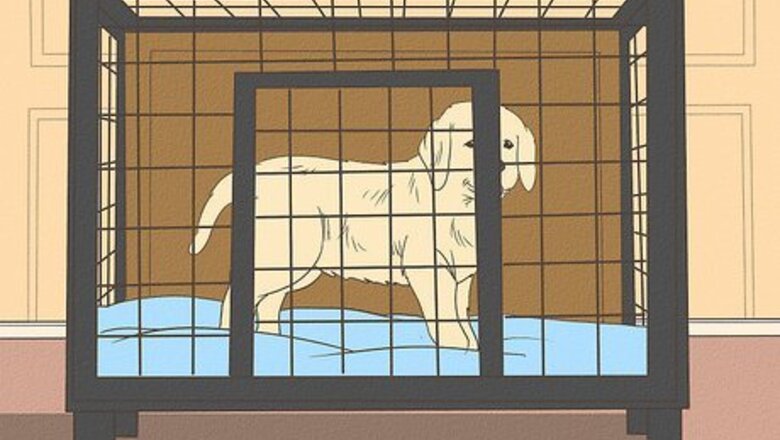
views
X
Trustworthy Source
PubMed Central
Journal archive from the U.S. National Institutes of Health
Go to source
It can give your pup a honking cough and cause them to feel like anything but themselves. So, how can you treat it, and are there ways to prevent your dog from catching this illness? Take a look at our complete guide on kennel cough below to learn about symptoms, treatment options, causes, and more.
- Kennel cough is an extremely contagious disease dogs can catch from drinking, eating, coughing, sneezing, or playing around other dogs.
- If you suspect your pup has kennel cough, bring them to the vet immediately. Treating kennel cough varies depending on severity, so an evaluation is needed.
- To help ease your dog's cough symptoms at home, feed them a combination of lemon juice and honey.
Kennel Cough Treatment
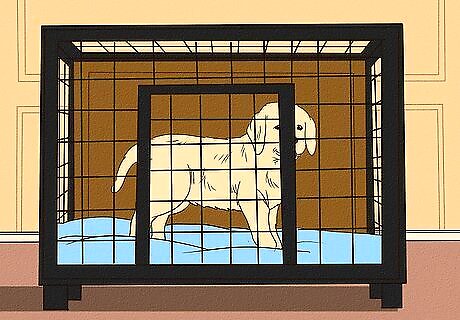
Isolate your dog from other dogs if you suspect kennel cough. Kennel cough is highly contagious. Each time your dog coughs, they release aerosol particles that can spread illness. Because of this, if you think your dog has kennel cough, make sure to move them away from other dogs immediately. Avoid walking your dog near other dogs or bringing them to dog parks. If you have more than 1 dog, they’re all likely to be exposed to kennel cough if only 1 pet shows symptoms. Call the veterinary clinic before bringing a possibly infected dog in, as the clinic may have safety procedures in place.
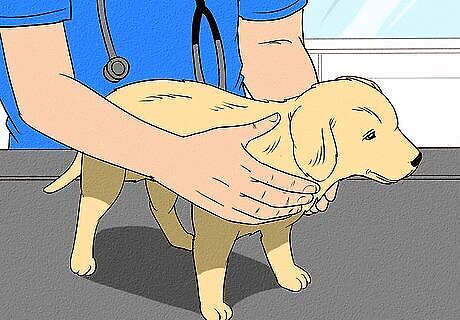
Take your dog to the vet immediately. It’s best to get any dog with a cough checked out by a veterinarian as soon as possible. The vet will be able to verify if your dog has kennel cough and how severe their case is. They can provide personalized treatment and help monitor your dog’s health, so they can start feeling better faster. Your vet will likely perform a thorough physical examination, including taking your dog's temperature, feeling their throat, checking their inside mouth, and listening to their heart and lungs. If they feel it’s necessary, your vet may do blood work, chest x-rays, or a PCR (Polymerase Chain Reaction Assay) to diagnose kennel cough.
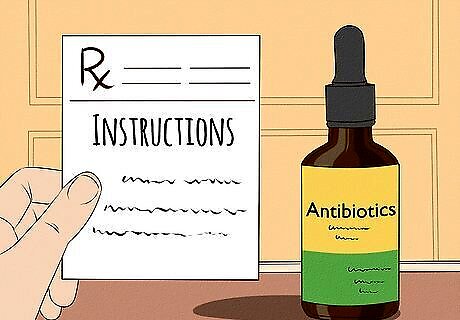
Administer antibiotics as instructed. Your veterinarian may prescribe antibiotics to help treat kennel cough, especially if they have a fever or signs of pneumonia. Give your dog the medication as instructed by your vet. Antibiotics aren’t appropriate in every case. Some cases of kennel cough are viral, and antibiotics likely won’t help. This is why it’s best to always follow your vet’s instructions and care plan, as they know what’s best for your pup.
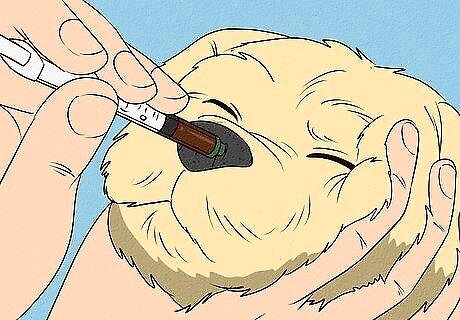
Give your dog cough medicine, if advised. In mild cases of kennel cough, a cough suppressant may be prescribed by a vet to help calm your dog’s symptoms. While coughing helps move phlegm out of your dog’s chest, it may be upsetting and uncomfortable for them. Cough medicine can help ease your dog’s worries and pain, allowing them to sleep and recover faster. Think of it like taking a cough drop when you have a cold. While coughing sometimes feels good, it can irritate your throat and make it harder to sleep. Cough suppressants work the same way for dogs as cough drops work for you! Never give your dog human cough or cold remedies before consulting your veterinarian first. Follow your vet’s instructions on how much and when to administer the cough suppressant to your dog.
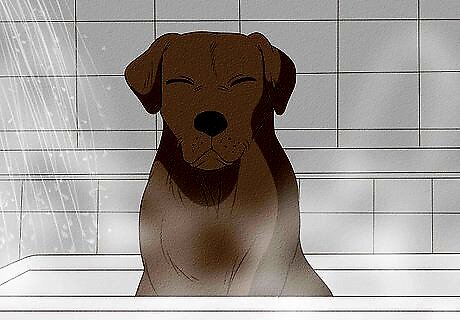
Ensure that your dog gets lots of rest. One of the best ways to treat kennel cough is with rest. The more your dog sleeps and relaxes, the more energy their body will have to fight the infection. So, reduce your dog's exercise to help them recover faster. Skip afternoon playtime and let your dog rest. Do your best not to touch or move your dog’s toys, even if they bring them to you, as they’re more inclined to play if you handle the toys. Avoid taking your dogs on walks while they’re sick, as being in public places can put other dogs at risk.
Treating Kennel Cough with Home Remedies
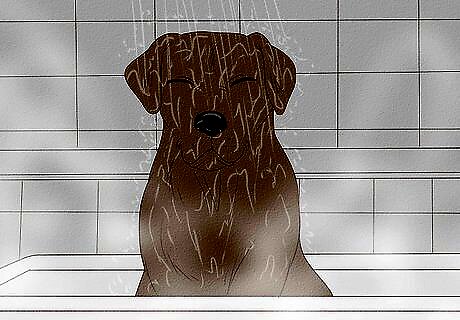
Put your dog in a hot, steamy room. Steam can help open your dog’s airways and lessen their cough. Run the shower on hot for a few minutes with the windows and doors closed. Then, after the room has steamed up, turn off the water and sit with your dog in the steamy atmosphere for 5 to 10 minutes. Repeat this process throughout the day whenever your pup’s cough gets excessive. Never leave your dog unattended in the bathroom with hot water running, as they may injure themselves. Alternatively, set up a humidifier near your dog’s bed or resting place. This will moisten the air around them and make it easier for them to breathe.
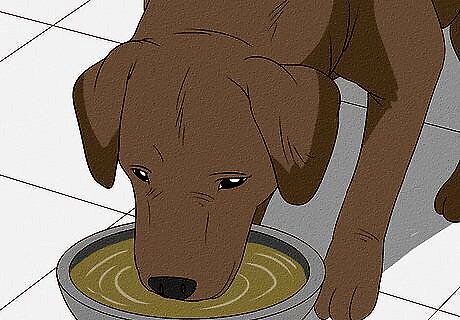
Feed your dog a mixture of lemon juice and honey. Believe it or not, a home remedy you use for your aching throat may help your pup feel better. Help soothe your dog’s irritated throat by mixing together 1 US tbsp (0.50 fl oz) of honey and 1 tsp (0.17 fl oz) of lemon juice in ⁄2 c (4.0 fl oz) of warm water. Put the mixture in a bowl and give it to your dog hourly. Avoid using this home remedy if your dog has diabetes, as the extra sugars could harm them.

Boost the dog's immune system with vitamins and natural oils. Some believe vitamin C, wild berry bark, peppermint, raw honey, and yerba santa can help improve a dog’s immune system. Talk to your veterinarian about holistic approaches and vitamins you can use to help your pup feel better naturally. Try mixing a crushed vitamin C tablet in your dog’s water or food or drizzling peppermint oil or honey over their kibble. While these holistic at-home treatments aren’t scientifically proven, some anecdotal evidence suggests they may be beneficial when treating kennel cough in dogs.
Kennel Cough Symptoms
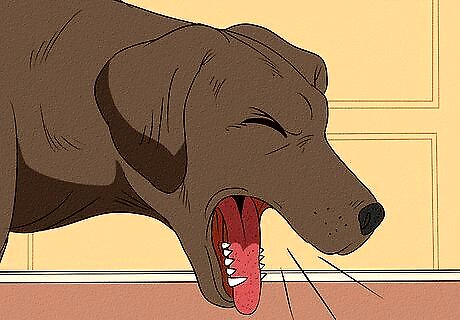
If a dog has kennel cough, they’ll cough and hack. Chances are, if your dog is coughing more than usual, they might have kennel cough. The cough is typically a dry hack and sounds like a dog is trying to get something out of their throat. This highly contagious respiratory disease can come with other symptoms, such as: Persistent hacking Coughing at night, keeping the dog away Sneezing and/or runny nose Throwing up white foam Tracheal sensitivity (dog coughs when you apply gentle pressure to the throat) Lethargy Loss of appetite Fever Labored breathing
Kennel Cough Causes
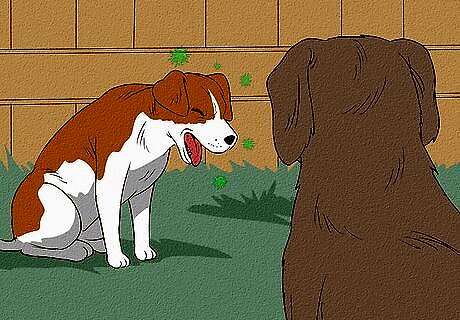
A healthy dog (no matter the age or breed) can get kennel cough when near an infected dog. Kennel cough in dogs is caused by bacteria and viruses and is highly contagious. Coughing, sneezing, and playing around or with other dogs can spread infection, especially in highly populated areas like animal shelters, boarding kennels, dog daycares, grooming places, and dog parks. Using the same food and water bowl and toys as an infected dog can also spread the disease. Kennel cough can develop in dogs 3 to 4 days after exposure. Bordatella bronchiseptica bacteria, canine adenovirus, parainfluenza virus, canine respiratory coronavirus, and mycoplasma are the bacterias and viruses that cause kennel cough.
Preventing Kennel Cough
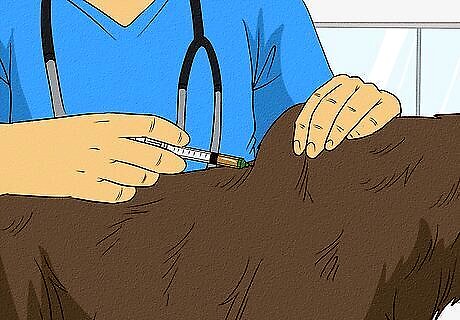
Make sure your dog is up to date on their vaccines. The best way to prevent kennel cough in dogs is to ensure they have all their shots or vaccinations. A Bordetella bronchiseptica vaccination is highly recommended for dogs that are around other dogs frequently, as the vaccine can help build your dog’s immune system against the most common kennel cough bacteria. Talk to your veterinarian about what vaccines your dog has and hasn’t had. Be open with your veterinarian about your dog’s lifestyle. For instance, if your dog goes to doggie daycare regularly, they’ll likely need boosters or extra vaccines to protect them from kennel cough and other contagious diseases.

Ask about vaccine requirements before bringing your dog to facilities. Dogs catch kennel cough from other dogs. To protect your dog, ask groomers and boarding facilities about their vaccination requirements before booking an appointment or stay. This way, you’ll know if the dogs your dog comes in contact with have been vaccinated against kennel cough or not. While vaccinations aren’t a cure, they are a proven preventative measure. If you don’t agree with a facility's vaccination requirements or they feel unsafe for your dog, bring your business elsewhere—there’s nothing wrong with exploring your options!
How long does it take a dog to recover from kennel cough?
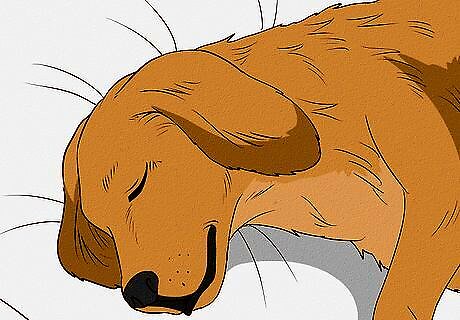
It can take 1 to 2 weeks for a dog to recover from kennel cough. In mild cases, kennel cough goes away relatively quickly if the dog has no pre-existing conditions. In more severe cases, it may take as long as 3 to 6 weeks for your dog to recover, especially if they develop complications. Keep in mind that there are different strains of kennel cough, meaning that your dog can get it more than once.
Is kennel cough fatal?
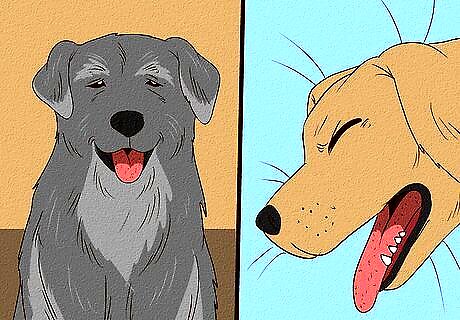
In severe cases, kennel cough may be fatal. Most dogs can recover from kennel cough without complications; however, some dogs may become extremely ill and catch life-threatening pneumonia. If your dog is healthy and you follow the treatment plan provided by your veterinarian, it’s highly likely that they’ll recover and return to their happy state again. If your dog falls into one or more of the below categories, they’re more susceptible to kennel cough complications: Puppies that haven’t been fully vaccinated Older dogs with low immune systems or other diseases (heart failure, diabetes, cancer) Pregnant dogs Dogs with pre-existing conditions (tracheal collapse, chronic bronchitis, respiratory allergies)















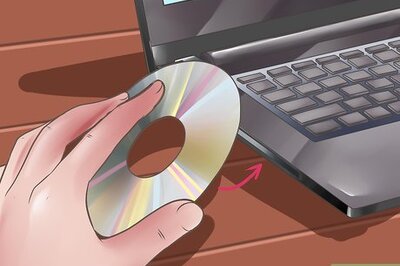




Comments
0 comment